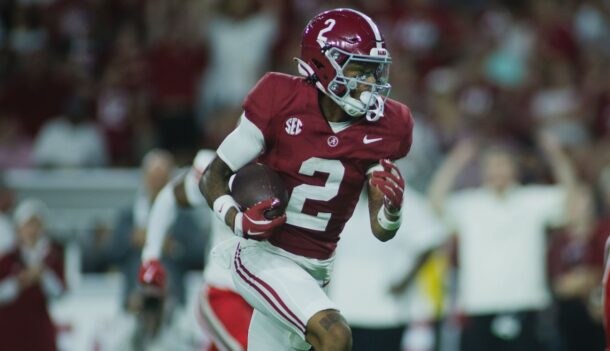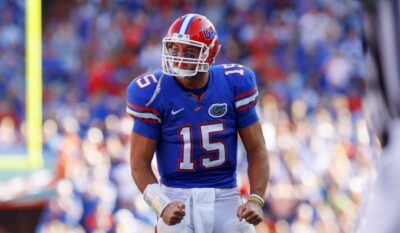Ever since 13 teams split off from the Southern Conference in December, 1932 to form the Southeastern Conference, the three letters “SEC” have been among the most important in college football. It took until 1951 for the conference to get its first title, but since then the SEC has won 22 national championships, with two more from future members Arkansas and Texas A&M.
Who have been the most important figures in the conference since its inception? There are countless names who have made a lasting impact, those with stadiums (hello, Shug Jordan and John Vaught) and awards named after them (good morning, Bobby Dodd) and players who have changed the game in a myriad of ways, from Joe Namath to Bo Jackson. There are far too many to attempt to list all of them here. Today, we focus on a few of those who have had far-reaching effects on the conference.
Coaches and administrators
Dan McGugin
Roles: Vanderbilt coach (1904-17, 1919-34), Vanderbilt athletic director (1934-36)
Accomplishments: 11 conferenece titles pre-SEC, 197–55–19 record as Vanderbilt coach
Effects: Guided Vanderbilt into SEC and led Commodores to the greatest era in school history, dominance over Tennessee led to Volunteers hiring Robert Neyland
Robert Neyland
Roles: Tennessee coach (1926-34, 1936-40, 1946-52), Tennessee athletic director (1936-41, 1946-62)
Accomplishments: Four national championships, five SEC championships, 173–31–12 record as Tennessee coach, four SEC Coach of the Year awards
Effects: Maxims still on display in Tennessee locker room; oversaw expansion of UT’s stadium, which was renamed for him; planned massive expansion of stadium before his death; considered one of the greatest coaches ever; also served as a general in the U.S. military
Frank Thomas
Roles: Alabama coach (1931-46), Alabama athletic director (1940-52)
Accomplishments: Two national championships, four SEC championships, 115–24–7 record as Alabama coach, 1945 SEC Coach of the Year
Effects: National championships in Rose Bowl established Alabama as a major power, coached and mentored Bear Bryant, established coaching clinics throughout the state of Alabama to help further the game’s development
Bernie Moore
Roles: LSU coach (1935-47), LSU track coach (1930-47), SEC commissioner (1948-66)
Accomplishments: 83-39-6 record as LSU coach, 12 national titles as LSU track coach, LSU track stadium named in his honor, member of College Football Hall of Fame
Effects: Moved SEC offices to Birmingham, Ala. as SEC’s second-ever commissioner, was longest-tenured LSU coach upon retirement, LSU’s track and field complex is named after him; oversaw conference for the league’s first-ever television broadcast, a 1951 game between Tennessee and Alabama
Paul “Bear” Bryant
Roles: Kentucky coach (1946-53), Alabama coach (1958-82), Alabama player (1933-35)
Accomplishments: Six national championships, 14 SEC championships, 60–23–6 record as Kentucky coach, 232–46–9 as Alabama coach, 12 SEC Coach of the Year awards
Effects: Considered the greatest college coach of all time, recruited players who broke Alabama’s color barrier in 1970s, Alabama’s stadium is named in part for him
Vince Dooley
Roles: Georgia coach (1964-88), Georgia athletic director (1979-2004), Auburn assistant (1956-63), Auburn player (1951-53)
Accomplishments: One national championship, six SEC championships, five SEC Coach of the Year awards, multiple national COY awards, 201–77–10 record as Georgia coach
Effects: Built Georgia into one of the best athletics departments in the country, part of a football family that includes son Derek and brother Bill (both former head coaches), created many of Georgia’s women’s sports programs and was a staunch supporter of Title IX
Roy Kramer
Roles: Vanderbilt athletic director (1978-1990), SEC commissioner (1990-2002)
Effects: Oversaw SEC’s first expansion since the league’s formation; brought SEC into divisional/title game era, giving the conference the first conference championship game in college football history; negotiated lucrative television contracts with major networks, helped generate SEC’s highest revenue to date in his final year (2001-02)
Mike Slive
Roles: SEC commissioner (2002-15)
Effects: Brought SEC out of a troubling era in which 75 percent of member teams were on probation, negotiated massive television rights deals for the conference, served as BCS coordinator for two years and advocated for a playoff system; expanded SEC from 12 to 14 teams, bringing in Missouri and Texas A&M; helped SEC generate record-setting revenue nearly every year of his career, culminating with more than $450 million in 2014-15
Players
Frank Sinkwich
Georgia running back, 1940-42
Stats: 2,271 yards rushing, 30 TD; 2,331 yards passing, 30 TD
Accomplishments: Two-time All-American, 1942 Heisman Trophy winner (first in SEC history), second-ever No. 1 overall NFL draft pick from the SEC
Steve Spurrier
Florida quarterback, 1964-66
Stats: 4,848 yards passing, 36 TD, 31 INT
Accomplishments: Two-time All-American, 1966 Heisman Trophy winner; known more as a coach at Duke, Florida and South Carolina and is the all-time wins leader at the latter two schools; brought with him a wave of high-powered passing offenses as Florida’s coach that helped revolutionized the college game
Ozzie Newsome
Alabama tight end, 1974-77
Stats: 102 receptions, 2,070 yards receiving, 16 TD
Accomplishments: 1977 All-American, Alabama’s player of the decade for the 1970s, set SEC record for yards per reception that stood for more than 20 years, revolutionized his position with size, strength and speed; after playing career, became the first African-American general manager in NFL history, two-time Super Bowl champion as Baltimore Ravens GM
Herschel Walker
Georgia running back, 1980-82
Stats: 5,259 yards rushing, 49 TD, 5,502 total yards from scrimmage, 52 total TD
Accomplishments: Widely considered the greatest SEC player of all time, led Georgia to first-ever national championship as a freshman, 1982 Heisman Trophy winner, was also an All-American sprinter in college and was an Olympian bobsledder in the midst of his NFL career, eventually went on to a career in mixed martial arts after football
Tim Tebow
Florida quarterback, 2006-09
Stats: 9,285 yards passing, 88 TD, 16 INT, 2,947 yards rushing, 57 rushing TD
Accomplishments: Considered the greatest quarterback in SEC history if not all of college football history, led Florida to two national championships (2006, 2008), 2007 All-American, 2007 Heisman Trophy winner, first-ever sophomore to win the Heisman, opening the door for multiple underclassmen to win the award in the years following; winner of multiple national player of the year awards
A former freelance journalist from Philadelphia, Brett has made the trek down to SEC country to cover the greatest conference in college football.







